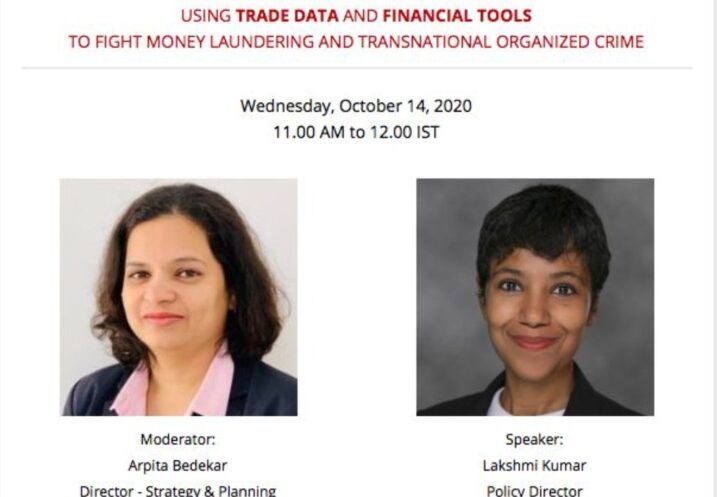
Illicit Gold in India Webinars
By Lakshmi Kumar, December 7, 2020

On the 14th and 21st of October, 2020, Global Financial Integrity (GFI) held a two-part webinar event on illicit gold trade in India, organized in conjunction with Fintelekt. The series explored issues in gold trafficking as a key money laundering and financing tool for criminal groups. Part one of the series, Illicit Gold Trade and Using Trade Data and Financial Tools to Fight Money Laundering and Transnational Crime, demonstrated investigative techniques to identify trade-based money laundering (TBML) risks – and why these issues are pertinent for India in particular. The second part of the series, Illicit Gold Trade and TBML Policy Options, discussed the policy options for the Indian government and the private sector to address the risks of TBML in illicit gold trade.
https://www.youtube.com/watch?v=jXzty0oywQw
The first webinar kicked off with an insight into what makes gold particularly vulnerable to abuse by illicit actors. A cash business with limited oversight and licensing processes, the gold market provides anonymity to organized criminals, armed groups and corrupt oligarchs alike. Furthermore, the origins of gold are exceedingly difficult to track, and without any indication whether it was produced legitimately or otherwise, gold is attractive to illicit actors wishing to hide, move or invest their illicit proceeds.
Through a combination of country and company level trade data, key TBML risks were identified. With gold imports accounting for US$ 32.8 billion in 2018, India is the largest consumer of gold next to China. The gold import and export data further shows that the Indian government lost close to Rs. 700 crores in revenue from Trade-Based Money Laundering (TBML) schemes in trade with South Korea in 2017. Moreover, trade data on India’s gold imports from Africa, Switzerland and UAE provide vital information on heightened risk, as these countries of origin and commodity trade hubs are under global scrutiny for weak due diligence standards.
The webinars also highlighted the difference between the US and India in their perception of gold money laundering risks. As opposed to the gold markets in Europe and the US, the Indian banking sector has high exposure to the gold market, and is involved in round-tripping of finance and other TBML schemes. As such, gold money laundering risk in India is not framed in terms of national security like it is in the US, but rather as a threat to Indian macroeconomic policy and the financial system. This difference is reflected in their diverging policy interventions. With a focus on risks for the Indian banking sector and Indian macroeconomics, policy interventions by the Indian government focus on the areas of customs and trade finance, whereas the US tends to focus on supply chain integrity. Neither have fully tapped into the area of Commodity Market Trading yet.
The second webinar further provided an analysis of the current policies and legislation in the UAE, Switzerland and India. Using two recent TBML cases as examples, recommendations for policy interventions in India were provided.
Director of Strategy & Planning at Fintelekt Advisory Services, Arpita Bedekar moderated this event with GFI’s Policy Director Lakshmi Kumar.
